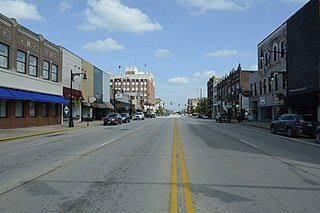
Galesburg is a city in Knox County,Illinois,United States. The city is 45 miles (72 km) northwest of Peoria. At the 2010 census,its population was 32,195. It is the county seat of Knox County and the principal city of the Galesburg Micropolitan Statistical Area,which includes all of Knox and Warren counties.
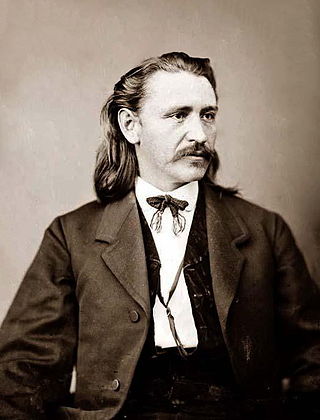
Elias Cornelius Boudinot was an American politician,lawyer,newspaper editor,and co-founder of the Arkansan who served as the delegate to the Confederate States House of Representatives representing the Cherokee Nation. Prior to this he served as an officer of the Confederate States Army in the Trans-Mississippi Theater of the American Civil War. He was the first Native American lawyer permitted to practice before the U.S. Supreme Court.
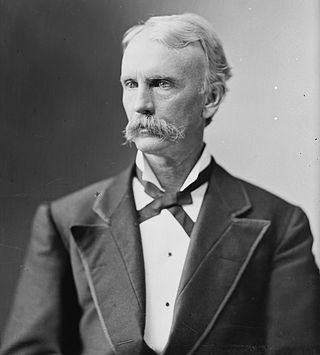
James Noble Tyner was a lawyer,U.S. Representative from Indiana and U.S. Postmaster General. Tyner was elected to the U.S. House of Representatives in 1869 and served three terms from 1869 to 1875.

Dearborn Station was,beginning in the late 1800s,one of six intercity train stations serving downtown Chicago,Illinois. It remained in operation until May 1,1971. Built in 1883,it is located at Dearborn and Polk Streets,to the south of the Loop,adjacent to Printers Row. The station was owned by the Chicago &Western Indiana Railroad,which itself was owned by the companies operating over its line. The station building headhouse now houses office,retail,and entertainment spaces,and its trackage yard,behind the headhouse,was redeveloped into part of the Dearborn Park neighborhood.
The Evansville and Crawfordsville Railroad Company was Evansville,Indiana's first railroad company. It was first chartered in 1853 by William D. Griswold,a lawyer in Terre Haute,Indiana. It was renamed Evansville and Terre Haute Railroad in 1877. It went on to be consolidated without railroads of the region into the Chicago &Eastern Illinois Railroad. Chauncey Rose was a key player in financing its construction.

Chauncey Rose was an American businessman during the 19th century.
Armstead Milton Alexander was an American attorney and politician from Missouri who served as a member of the United States House of Representatives from 1883 to 1885.

The Carnegie Center for Art &History,within the Downtown Historic District of New Albany,Indiana,is a contemporary art gallery and local history museum. The Carnegie Center offers a variety of exhibitions,events,and learning opportunities for the public. The Carnegie Center is a branch of the New Albany-Floyd County Public Library.
The Sweet Gum Stable,also known as Farmer's Feed and Supply,was located at the southeast corner of Main and W. Seventh Street in New Albany,Indiana. The property was a stop of the Underground Railroad,ten blocks west of another stop,the Town Clock Church,and a mere block away from the River Jordan for fugitive slaves,the Ohio River. The stable was built in 1877,and consisted of a balloon frame stable with an attached small brick and frame dwelling constructed about 1836. A feed store was added to the building in 1886. The structured measured 60 feet by 120 feet and encompassed the entire lot.
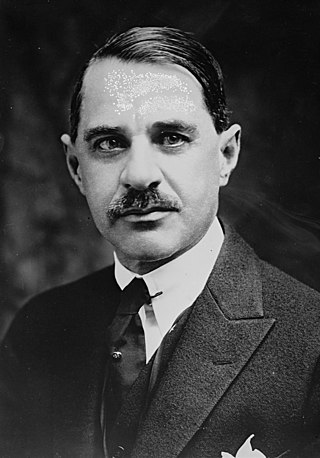
Frederick Gleed Fleetwood was an American lawyer and politician from Vermont. He was most notable for his service as Secretary of State of Vermont and a U.S. Representative (1923–1925).
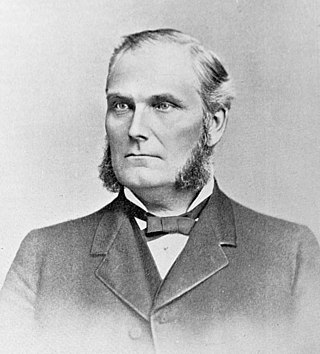
Horace Henry Powers was an American lawyer,judge and politician. He was most notable for his service as an Associate Justice of the Vermont Supreme Court and a U.S. Representative from Vermont (1891–1901).

Isaac Clements was a U.S. Representative from Illinois.

Pamela Lynn Carter is an American lawyer,politician,and business executive. She was the first black woman to serve as a state's attorney general. She served as Indiana Attorney General from 1993 to 1997.

Leo Carter DeTray was an American football player and coach of football and basketball. He served as the head football at Wittenberg University in Springfield,Ohio in 1910,University of Mississippi in 1912 and at Knox College in Galesburg,Illinois from 1915 to 1916,compiling a career college football coaching record of 10–7–2. DeTray was also the head basketball coach at Knox from 1915 to 1917,tallying a mark of 10–10.

Lucy Higgs Nichols was an African American woman who escaped slavery. She served as a nurse for the Union Army during the American Civil War. Known affectionately as "Aunt Lucy",her sole photo shows her surrounded by veterans of the 23rd Indiana Volunteer Infantry Regiment,of the Army of the Tennessee. She was as devoted to the soldiers as they were to her and her daughter,Mona. She lost her daughter and husband during the Civil War,and after the war ended,settled in New Albany,Indiana,where she worked as a housekeeper to several officers and eventually married her second husband,John Nichols. She lived in New Albany with her husband for more than forty years,until her death on January 25,1915,at the Floyd County Poor House.
George DeBaptiste was a prominent African-American conductor on the Underground Railroad in southern Indiana and Detroit,Michigan. Born free in Virginia,he moved as a young man to the free state of Indiana. In 1840,he served as valet and then White House steward for US President William Henry Harrison,who was from that state. In the 1830s and 1840s DeBaptiste was an active conductor on the underground railroad in Madison,Indiana. Located along the Ohio River across from Kentucky,a slave state,this town was a destination for refugee slaves seeking escape from slavery.
Henry Musgrove was a politician in Mississippi during the Reconstruction era. He served as the Mississippi state auditor from 1869 until 1874,and as the Secretary of State of Mississippi in 1869. He ran on the Republican ticket with officials including James L. Alcorn who was elected governor. He moved to Mississippi in 1866 from Indiana.
Paul and Susannah Mitchem were a couple from Virginia who owned dozens of slaves;late in their life they decided to bring their slaves to Harrison County,Indiana and free them. They also used the Meachum surname. The Mitchems emancipated over 100 enslaved people in Indiana,most of whom settled around Corydon,Indiana. Farms,businesses,churches,and schools were established by and for the African American community,often called the Mitchem Settlement.
Colonel Preston Withers Farrar was an American lawyer and Whig politician. He was the Speaker of the Louisiana House of Representatives from 1848 to his death in 1850. He also served in both houses of the Mississippi Legislature.

Franklin Guest Smith [freɪŋklɪn gɛst smɪθ] was a career officer in the United States Army. A Union Army veteran of the American Civil War,Smith also served in the American Indian Wars and the Spanish–American War,and attained the rank of brigadier general.













